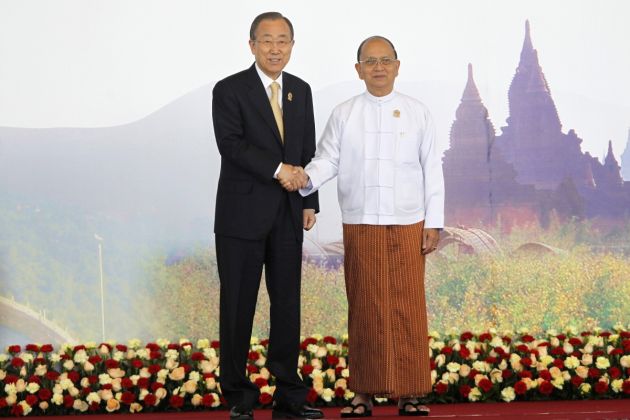Myanmar aide lashes Ban Ki-moon for using ′Rohingya′ to refer to Muslim minority

For a chief minister overseeing a restive state in Myanmar, the United Nations ought to its words carefully lest its comments spark yet another backlash against the oppressed Rohingya minority.
Rakhine State Chief Minister U Maung Maung Ohn warned U.N. Secretary-General Ban Ki-moon about "inflaming local sentiment" after Ban appealed for greater rights for Rohingya Muslims who are discriminated against in the country.
"The international community's insistence on the use of the term 'Rohingya' has alienated the Rakhine population," U Maung Maung Ohn wrote in a letter published in the government's Ministry of Information website.
He said the term "further fueled their distrust of all the United Nations agencies and international organizations such as MSF that are providing much needed assistance inside Rakhine state."
Ban had publicly appealed to Myanmar authorities at a press conference in the capital Naypyidaw to treat its Muslim minorities better.
The rising wave of violence against Rohingyas has produced an alarming humanitarian crisis, as the minorities who are essentially stateless seek to leave the country in droves to find a better life.
Myanmar insists on using the term "Bengali" to refer to Rohingyas.
This is seen to insinuate that the minority slipped into the country as illegal immigrants from Bangladesh.
The government is conducting a citizenship verification drive aimed to identify the minority living in the country.
Rohingyas who are allowed to be listed as Bengali in the census get rights granted to foreigners, unlike citizens. As the division deepens, some Myanmar citizens have threatened genocide on Rohingyas.
In the speech, Ban justified the use of the term Rohingya, as he encouraged the government to "to avoid measures that could entrench the current segregation between communities."
"Efforts must be made to foster interfaith dialogue and harmony to bring the communities closer together," he told reporters.
A senior researcher on Myanmar affairs for the New York-based Human Rights Watch noted that the government's stance in the tense situation in Rakhine state has derailed the development of the country in general.
"For Rakhine leaders to continue to deny the existence of the Rohingya and insist on apoplexy when the word is used is the one of the major impediments to resolving the Rakhine crisis," David Mathieson wrote in an email to Agence France-Presse.
"To put blame on the U.N. simply for using the word Rohingya is disturbing nihilism, and will only frustrate plans to develop all of the region," he said.